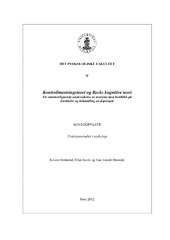Kontrollmestringsteori og Becks kognitve teori. En sammenlignende undersøkelse av teoriene med henblikk på forståelse og behandling av depresjon
Master thesis
Permanent lenke
https://hdl.handle.net/1956/6430Utgivelsesdato
2012-11-21Metadata
Vis full innførselSamlinger
- Faculty of Psychology [527]
Sammendrag
Psychotherapy theories differ in how they understand and approach depression (Nordahl et al., 2012). In this paper we compare the control-mastery theory and Beck`s cognitive theory, with the aim to identify similarities and differences between the theories. In this comparison, similarities in conceptualization appeared. Both the control- mastery theory and Beck`s cognitive theory describe depression as developed on the basis of maladaptive cognitions (Beck, 1970; Weiss, 1993). At the same time, the theories differ in how they explain the development of such maladaptive cognitive structures. The control- mastery theory has a primary and overarching focus on the significance of relational aspects (Silberschatz, 2005). Beck assumes to a greater extent that several interacting factors are involved (Beck, 1970). The theories both promote that fundamental change in maladaptive cognitive structures is needed to create relief for the depressed patient (Beck, 1970; Weiss, 1993). The control-mastery theory and Beck`s cognitive theory differ in terms of interventions considered essential in therapy. In general, similarities between the theories primarily appear on the conceptual level. Greater differences are found in how the two theories view and describe the therapeutic approach to depression. Control-mastery theory emphasizes a highly individualized approach that places the therapeutic relationship and the workings of the unconscious at the center of the treatment (Silberschatz, 2005). Beck, on the other hand, approaches the depressed patient with a manual-based and diagnosis-specific treatment with a primary focus on correction of dysfunctional thinking (Wills, 2009). Ulike psykoterapiteorier forstår og tilnærmer seg depresjon på ulike måter (Nordahl et al., 2012). I denne oppgaven undersøkes likheter og forskjeller mellom kontrollmestringsteori og Becks kognitive teori. Det fremkommer likheter mellom de to teorienes forståelsesmodeller, ved at de begge anser maladaptiv kognisjon som tilgrunnliggende for depresjonsutvikling (Beck, 1970; Weiss, 1993). Samtidig er de ulike i sitt syn på hvordan maladaptive kognitive strukturer dannes. Kontrollmestringsteori har et overordnet fokus på relasjoners rolle (Silberschatz, 2005), mens Beck trekker frem hvordan flere interagerende faktorer er av betydning (Beck, 1970). Både kontrollmestringsteori og Beck hevder at bedring hos deprimerte pasienter forutsetter endring av de maladaptive kognitive strukturene (Beck, 1970; Weiss, 1993). Retningene skiller seg imidlertid kvalitativt fra hverandre når det gjelder hvilke terapeutiske intervensjoner som blir vektlagt i behandlingsarbeidet. På et overordnet plan kan en derfor si at kontrollmestringsteori og Becks kognitive teori viser konseptuelle likheter, mens det fremkommer større ulikheter i hvordan de tilnærmer seg depresjon i behandling. Kontrollmestringsteori kjennetegnes av en ytterst individspesifikk tilnærming, hvor den terapeutiske relasjonen og ubevisste prosesser ses som sentrale elementer (Silberschatz, 2005). Beck fordrer på sin side en manualbasert og diagnosespesifikk behandling, hvor fokus blir rettet mot korrigering av maladaptiv kognisjon (Wills, 2009).
